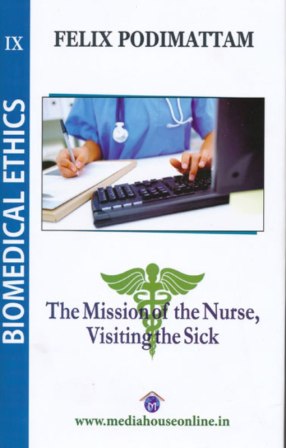Description
Dr. Felix Podimattam is one of the best-known moral theologians in India & outside. Besides his full time job as a professor, he finds time to write books at an amazing rate. He has authored 136 books.
Besides his Masters degree in Political Science from Mysore, he holds a Licentiate in Theology from the Pontifical Gregorian University, Rome, & subsequently a Doctorate in Moral Theology from the Alphonsian Academy, Rome. His post-doctoral studies were pursued in Washington, DC, USA. At present he is professor of Moral Theology at St. Francis Theological College, Kottayam, Kerala, India.
CONTENTS
PREFACE
INTRODUCTION
THE MISSION OF THE NURSE
CHAPTER ONE
FOUNDATIONAL CONSIDERATIONS
1. The Urgency of Moral Discussion in Nursing
2. The Professional Codes
3.TheHebre\v-ChristianMoralTradition
4. The Moral Point of View
5. The Logic of Moral Decision-Making
6. Some Basic Moral Principles
6.1. Moral Decision Making and the Principle of Lesser Evil
6.2. Moral Decision Making and the Principle of Tension Morality
6.3. Moral Decision Making and the Principle of
Cooperation and Appropriation
6.3.1. Legitimate Cooperation with Evil
6.3.2. Legitimate Appropriation of Evil
CHAPTER TWO
THE ROLE OF THE NURSE
CHAPTER THREE
THE NURSE-DOCTOR RELATIONSHIP
1. The Traditional Model of Relationship
2. The Traditional Role does not Tally with Reality
3. The Joint Practice Concept
4. The Behavior of the Nurse Pastorally Considered
CHAPTER FOUR
THE NURSE-CLIENT RELATIONSHIP
1. The Nurse and the Abortion Patient
2. The Nurse and the Care of Defective Newborns
3. The Nurse and the Dieng Patient
4. The Nurse and the Aged and Chronically 111 Patient
CHAPTER FIVE
MORAL RESTRAINTS
1. Is Informed Consent akvavs Morally Required?
2. When, if ever, is Coercion Permissible?
3. Must the Nurse always Tell the Truth?
4. When, if ever, may Confidentiality be Breached?
CHAPTER SIX
THE NURSE AS A MEMBER OF A PROFESSION
CHAPTER SEVEN
THE NURSE AS AN EMPLOYEE
CHAPTER EIGHT
QUESTIONS OF JUSTICE
CHAPTER NINE
PASTORAL REFLECTIONS
PART TWO
VISITING THE SICK
CHAPTERTEN
KNOWLEDGE OF SICK PEOPLE AND THEIR NEEDS
1. The Stresses of being Sick
2. Different Categories of the Sick
2.1.The Demanding-Dependent
2.2. The Orderly-Controlled
2.3. The Dramatic-Emotive
2.4. The Hypochondriac
2.5. The Passive-Aggressive
2.6. The Unstable
3.Being Sick and the Process of Adapting to It
3.1. A Person’s Needs in Times of Sickness
3.2. The Experience of Sickness
3.3. Living in the Present
4. Sick Persons in the Role of Care-Givers
4.1. Sick Persons as Instructors
4.2. Sick Persons as Partners
4.3. The Care-Giver as a Mirror for Those Who are Sick
CHAPTER ELEVEN
ASSISTING THOSE WHO ARE SICK
1. Personal Hygiene
1.1. The Regular Bath
1.2. Preparation for the Bath
1.3. Special Baths
1.4. Care of the Mouth
1.5. Care of the Hair
1.6. Care of the Nails
1.7. Care of the Skin and Bed Sores
2. Proper Diet
2.1. Serving Meals
2.2. A Therapeutic Diet
2.3. A Good Food Balance
3. Moving Those Who are Sick
3.1. Some Rules for Bodily Movement
3.2. Walking
3.3. Using a Walker
3.4. Using Crutches
3.5. Using a Wheelchair
3.6. Moving from a Bed to a Wheelchair and
from a Wheelchair to a Bed
4. Communicating with a Deaf Person
4.1. Creating a Favorable Milieu
4.2. What the Speaker Should Do
4.3. What the Listener Should Do
4.4. Hearing Aids
5. Assisting Those Who are Visually Handicapped
5.1. Our Attitude toward Blind Persons
5.2. How to Guide a Blind Person
5.3. Meals for Those Who are Blind
6. The Art of Being with Someone Who is Lonely
6.1. The Importance of Good Communication
6.2. Verbal and Non-Verbal Communication
6.3. Four Attitudes Conducive to Good Communication
6.4. Obstacles to Effective Communication
CHAPTER TWELVE
MINISTERING TO THOSE WHO ARE SICK
1. The Visiting Care-Giver and Active Listening
1.1. Available for Listening
1.2. Available for Loving
2. The Visiting Care-Giver and
those Suffering from Specific Illnesses
2.1. Those Who are Chronically 111
2.2. Those Who are Confused
2.3. The Person with AIDS
3. The Visiting Care-Giver Relating with Others
3.1. Relating with Parents and Friends of Those Who are Sick
3.2. Relating with Hospital Personnel
4. Caring for Those Who are Dying
4.1. The Needs of the Dying Person
4.2. The Dying Person’s Reactions to Death.
4.3. Accompanying a Dying Person
5. Practical Information for Those Who are Terminally 111
5.1. The Rights of Sick Persons
5.2. The Living Will
5.3. Funeral Arrangements
CHAPTER THIRTEEN
ACCOMPANYING SPIRITUALLY THOSE WHO ARE SICK
1. The Spiritual Needs of Those Who are Sick
1.1. Difficulties Sick Persons Must Face
1.2. A Reassuring Presence
1.3. Crises as Opportunities for Growth
1.4. A Deepening Inferiority
2. Faith in a God of Love
2.1. Faith Means Saying Yes to God
2.2. A New Dynamic Life
2.3. Toward Peace and Serenity
2.4. A Meaning for Life and Death
2.5. Living the Paschal Mystery with Jesus
3. Prayer
3.1. What is Prayer?
3.2. Praying with Those Who are Sick
3.3. Different Kinds of Prayer
3.4. The Sacraments for the Sick Person
3.5. The Sick Person’s Prayer
4. Living in Hope
4.1. At the Edge of Despair
4.2. Christian Hope
BIBLIOGRAPHY.
END NOTES
INDEX




Reviews
There are no reviews yet.